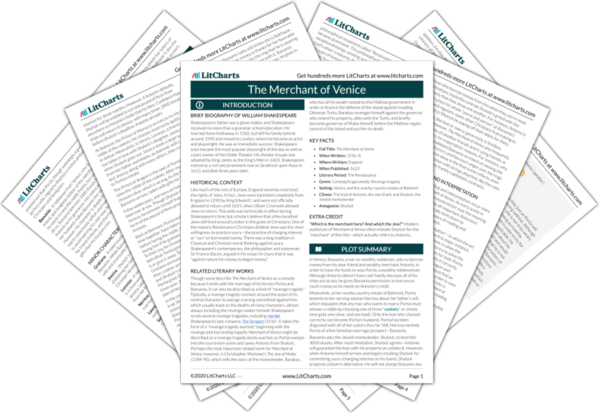Both the central action of The Merchant of Venice—Shylock's attempt to revenge himself on the Christian Antonio—and the romantic subplot—between Bassanio and Portia—explore the relationship between law, mercy, and revenge.
Shakespeare's contemporary, the philosopher Francis Bacon, defined revenge as a "kind of wild justice." When one private individual decides to revenge himself on another, he is going outside the official justice system. And yet, as the phrase "wild justice" suggests, the revenger is responding to what he sees as a "higher law." The revenger takes the law into his own hands when he feels that the state is not capable of or refuses to enforce justice. Therefore, while law and revenge are technically opposed to each other, since revenge is illegal, they also overlap. Shylock, pursuing Antonio's "pound of flesh," exposes the intimate connection between law and revenge. He seeks vengeance against Antonio precisely by sticking to the letter of the law within the Venetian justice system.
In the courtroom scene of Act 4, scene 1, both the Duke and Portia present mercy as a better alternative to the pursuit of either law or revenge. Shylock explicitly refuses to show mercy, while the Christians, in sparing Shylock's life in the end, claim that they have. Yet, when they do, Shylock himself asks to be killed. He says that, having had all of his possessions confiscated and his religious identity revoked (which would also make it impossible for him to work as a money-lender, since Christians were not allowed to practice usury), he has nothing left to live for. The question of who is or is not merciful, therefore remains open.
Law, Mercy, and Revenge ThemeTracker

Law, Mercy, and Revenge Quotes in The Merchant of Venice
Be nominated for an equal pound
Of your fair flesh, to be cut off and taken
In what part of your body pleaseth me.
It droppeth as the gentle rain from heaven
Upon the place beneath. It is twice blest:
It blesseth him that gives and him that takes.
'T is mightiest in the mightiest: it becomes
The throned monarch better than his crown;
His sceptre shows the force of temporal power,
The attribute to awe and majesty,
Wherein doth sit the dread and fear of kings;
But mercy is above this sceptred sway,
It is enthroned in the hearts of kings,
It is an attribute to God himself;
And earthly power doth then show likest God's,
When mercy seasons justice. Therefore, Jew,
Though justice be thy plea, consider this,
That in the course of justice none of us
Should see salvation: we do pray for mercy;
And that same prayer doth teach us all to render
The deeds of mercy.
The penalty and forfeit of my bond.
You take my house when you do take the prop
That doth sustain my house; you take my life
When you do take the means whereby I live.
















